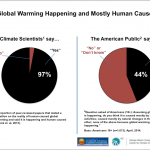Why the Public Doesn't Believe in Climate Change

Consider a medical analogy… If you saw 100 doctors about a mole that had appeared on your chest, and only three of them told you that it was benign, the chances are that you would probably do something about it, no matter how much those three doctors told you not to worry and that it would soon go away.
Climate Change is happening, global warming is real, our planet is changing irrevocably, and it is almost entirely our fault. This is not an opinion or a provocation; this is scientific fact, agreed upon by approximately 97% of climate scientists. If you don’t believe me, then look at this study, or this one, or even this one.
But then there’s this equally unavoidable fact. According to the Yale Project on Climate Change Communication, in 2014, only 44% of Americans said they thought global warming is both happening and human caused. Without the public accepting the seriousness of climate change and their own culpability in causing it, they are far less likely to want to accept climate change mitigation policies, such as the recent Obama Clean Power Plan.
So why is there such a big gap between what scientists say and what the rest of the population think? Two 2015 papers from the PLOS research collection Responding to Climate Change, discuss this disconnect, and present some straightforward, yet effective solutions.
In The Scientific Consensus on Climate Change as a Gateway Belief: Experimental Evidence, Dr van der Linden and his colleagues find that an increased public perception in the consensus of climate scientists acts as a gateway, leading to an increase in the belief that climate change is happening, that it is human-caused, and that it is a problem that needs to be addressed. These changes in belief were then found to lead to an increase in support for public action. In other words, the more that the general public believe that scientists agree that climate change is a real, human-caused problem, the more they believe in it, and the more that they are willing to accept policies that combat it.
The problem however, is that the general public still don’t appear to believe that there is scientific consensus, with only 12% of Americans correctly estimating scientific agreement as 90% or higher. Part of the reason for this public misunderstanding is the strategic spread of misinformation by the organised opponents of climate change. This very vocal minority works hard to give the impression that there is not a consensus, which can therefore ultimately have a very damming effect on the uptake of climate policy by the general populous. This spread of information, combined with a “false balance” in news coverage (in which journalists have traditionally followed a pattern of finding representatives on either side of the debate), gives the impression that there is far less scientific consensus than there is in reality. However, as the study concludes:
Repeated exposure to simple messages that correctly state the actual scientific consensus on human-caused climate change is a strategy that is likely to help counter the concerted efforts to misinform the public.
In Simple Messages Help Set the Record Straight about Scientific Agreement on Human-Caused Climate Change: The Results of Two Experiments, Dr Teresa Myers and colleagues discuss the effectiveness of different approaches to communicating the consensus of climate scientists. They conduct two large-scale studies in which they find that simple, clear messages can be used to improve the general public’s perception of the scientific consensus.
One of the key findings of the study was that members of the general public were more likely to correctly estimate scientific agreement when presented with quantitative rather than qualitative statements, for example “97% of climate scientists have concluded that human-caused climate change is happening” was found to be more effective than “An overwhelming majority of climate scientists have concluded that human-caused climate change is happening”, both in terms of what the participants estimated the scientific agreement to be, and their confidence in that estimation. The other major finding of the study was that these estimations were found to be higher if an “estimation and reveal” technique (in which the participants were first asked to guess what they thought the consensus was, before being shown a statement outlining the consensus, and then being asked to guess again) was used.
What works to change minds?
Whilst the findings of the study are encouraging, and offer practical advice to climate scientists wishing to communicate the consensus of their opinions (i.e. use numerical descriptions of scientific agreement, and try to incorporate the “estimation and reveal” method), it is still somewhat surprising that even the most effective messages still only led to a public perception of 89% scientific consensus, i.e. 8% lower than the true value of 97%. However, as the authors themselves note:
It is unlikely that a single exposure to a scientific agreement message will result in complete belief updating; however, … simple clear messages, repeated often, by a variety of trusted sources is an effective framework for public communication.
Both of these studies also clearly demonstrate that these methods are effective independent of political ideologies. However, as they also demonstrate, the acceptance of any climate change mitigation policies can only be brought about by effectively communicating the true scientific consensus on climate change.
As climate scientists, one of the most important steps that we can take is in accurately portraying our unanimity on the subject, and making sure that it is heard above the sometimes deafening dim of the climate sceptics and their strategic spread of misinformation.
Sam Illingworth is an Atmospheric Physicist and lecturer in Science Communication at Manchester Metropolitan University in the UK. His research involves looking at the ways in which science interacts with society via different cultural media. When he is not doing that he likes to write bad poems about good science, some of which can be read here. Twitter: @samillingworth
